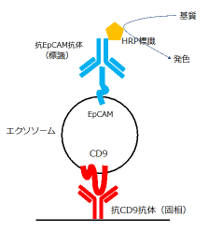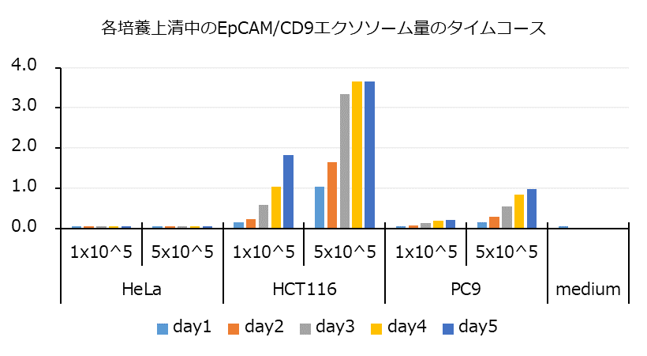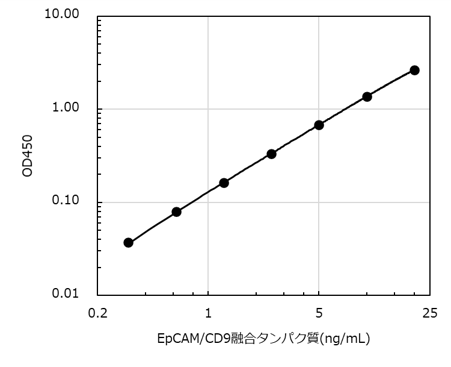This product is a two-step sandwich ELISA kit that uses high-performance monoclonal antibodies against CD9, an exosome marker, and EpCAM, which is said to be a diagnostic and prognostic marker for epithelial tissue-derived cancer, to directly and quantitatively detect EpCAM-positive exosomes secreted by cells in human blood or cell culture medium.

Background
What is human EpCAM (epithelial cell adhesion molecule)?
Human EpCAM (epithelial cell adhesion molecule) is a transmembrane glycoprotein consisting of 314 amino acids that is present on the cell membrane surface. EpCAM is overexpressed in many cancer tissues, and increased expression of EpCAM is observed in colon, rectum, breast, lung, and prostate cancers in particular . EpCAM is not only involved in cell-cell adhesion, but also affects other important cellular functions related to tumor progression, such as cell proliferation and cancer stemness. EpCAM is a vesicle with a diameter of 30 to 200 nm that is secreted by almost all cells that compose the body. It has also been reported that most types of cancer tissues release a large number of exosomes that carry molecular information about tumor cells . EpCAM is a vesicle with a diameter of 30 to 200 nm
that is secreted by almost all cells that compose the body. EpCAM is a vesicle with a diameter of 30 to 200 nm that is secreted by almost all types of cancer tissues. EpCAM is a vesicle with a diameter of 30 to 200 nm that is secreted by almost all types of cancer tissues . EpCAM is a vesicle with a diameter of 30 to 200 nm that is secreted by almost all types of cancer tissues in the body. EpCAM is a vesicle with a diameter of 30 to 200 nm that is secreted by almost all types of cancer tissues in the body .
EpCAM is a vesicle with a diameter of 30 to 200 nm that carries molecular information about tumor cells. EpCAM is a vesicle with a diameter of 30 to 200 nm that is secreted by almost all types of cancer tissues in the body ...
Features
- Direct quantification of EpCAM-positive exosomes in human blood samples, cell culture supernatants, etc.
- No special equipment is required; measurements can be performed with a standard plate reader.
- Stability and reproducibility are ensured by using EpCAM/CD9 fusion protein (standard protein) instead of exosomes themselves, which lack storage stability as a standard reagent.
- Relative quantification of each sample is possible by reading from a standard curve using EpCAM/CD9 fusion protein (standard protein).
- Compatible samples: serum, plasma, cell culture supernatant
Kit Components
| Contents | capacity | quantity |
|---|---|---|
| Anti-CD9 antibody immobilized plate | 96 well (8-well x 12 strips) | 1 sheet |
| Standard protein (EpCAM/CD9 fusion protein) | 100 µL | 1pc *1 |
| Assay Buffer | 25 mL | 1 bottle |
| Washing buffer (10x) | 25 mL | 1 bottle |
| HRP-labeled anti-PD-L1 antibody (500x) | 20 µL | 1 bottle |
| Substrate solution | 12 mL | 1 bottle |
| Stop solution ( 2N H2SO4 ) | 6 mL | 1 bottle |
| Plate seal | - | 2 sheets |
*1 : n=2, two calibration curves
Specification
| Cross-reactivity | Sample Type | Measurement range | sensitivity |
|---|---|---|---|
| Human | Serum, Plasma, Cell culture supernatant | 0.313–20 ng/mL | 0.14 ng/mL |
*Calculated from the standard deviation of blank absorbance and the slope of the calibration curve5 )
Example data
| Product Specifications | |
| Reactivity | Human |
| Documents & Links for EpCAM/CD9 Exosome ELISA Kit (Human) | |
| Datasheet | EpCAM/CD9 Exosome ELISA Kit Datasheet |
| Documents & Links for EpCAM/CD9 Exosome ELISA Kit (Human) | |
| Datasheet | EpCAM/CD9 Exosome ELISA Kit Datasheet |




